Programmes for Schools and Colleges
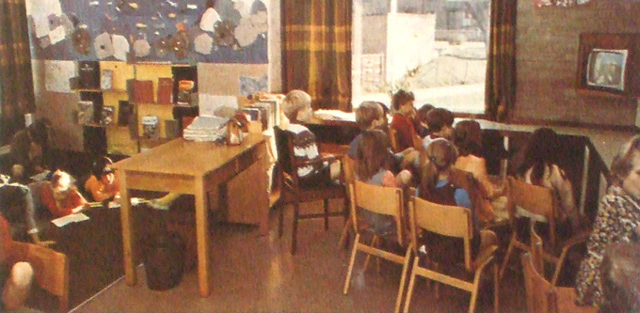
They’ve been with us since 1951, since the heady, closed-circuit days of Living in the Commonwealth and Frisch Begonnen. They were never big news in the world of entertainment, or epic works of the imagination. They were progammes with a job to do, and they got on with it, quietly, sensibly and, above all, cheaply. But for anyone between 25 and 45, these simple daytime knowledge boosters, just another element alongside textbooks, worksheets and slide-tape presentations in the teacher’s armoury, have lodged themselves in the memory decades after their humble mission to explain base eight and the apostrophe ended.
The ’70s and early ’80s were the heyday of ITV and BBC schools’ television. From basic beginnings, they had begun to explore new ways to teach dry maths and English principles, evolving into some downright odd forms that challenged anything in the ‘civilian’ telly world of weirdness. By 1980 each channel was making around 50 series for schools and colleges a year. 84 percent of primary schools and 69 percent of secondary schools were making use of daytime TV programmes in lessons, and 75 percent of secondary schools also had access to the mysterious and magical “television recorders”, which would later be the undoing of the daytime schools programme service, as programmes which were to be taped could be broadcast at three in the morning, freeing up the daytime slots for valuable Quincy repeats. Then the advent of Cash in the Attic and the Internet (and the two go in that order of importance, as indeed they always should) reduced the old daytime slots to a big fat zero on the ratings number line.
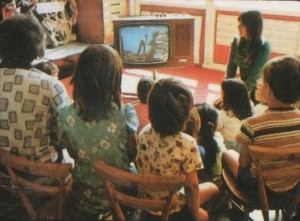 |
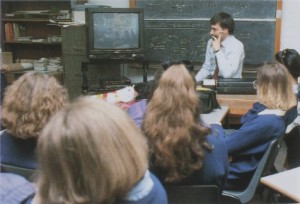 |
One of the main reasons these programmes are so well remembered is that ritual that surrounded viewing them – either a huge Ferguson TX television, complete with sturdy metal stand, veneered protective swing doors and an odd sticker bearing the legend “Push from this end only”, was carefully wheeled into the classroom and chairs arranged around it, or the class was marched en masse down to the “television room”, which may have been a hall, the staff room, or the duplicating fluid-scented resources room, and sat cross-legged on the floor (or those splintery wooden chairs, if you were at Eton or somewhere recently patronised by an oil sheik) as the blue caption clocks counted down the final minute to transmission of Over To You, inevitably accompanied by the sounds of mock gunfire from trigger-happy pupils.
Other programmes could be viewed in solitary confinement, tucked up in bed on a sick day off school with a stack of Monster Fun comics, a bottle of Lucozade and ‘something eggy on a tray’ , the combination of school-missing joy and buttercup syrup making the likes of Maths Topics take on an otherworldly dimension. Here we’ve broken the programmes down into five rough formats, to help demonstrate how these most practical of programmes managed to evolve from the no-nonsense to the supremely bizarre.
This was very much the entry-level format for educational programming, and although its basic ‘point and shout’ dynamics looked out of date even by the time the first educational broadcasts were cranked out on closed-circuit systems, it still lasted well into the ’80s. Essentially it was a simple, straight-ahead illustrated talk, presented much as a straight-ahead teacher might conduct a lesson. Science and maths were the main subjects to receive this treatment, where a basic, no-nonsense dissemination of facts was the order of the day. Ties will be worn by all pupils.
ITV’s Experiment and the BBC’s Chemistry (and Biology and Physics) in Action are textbook examples of the genre, in all senses. Experiment was so down-to-earth it didn’t even bother with such frivolities as a theme tune or in-vision presenter. Instead, for the most part, educational film producer Jack Smith’s disembodied voice guided the class through some on-screen chemistry experiments, conducted in a plain studio by a faceless white-coated experimenter, the equipment forever shot in impersonal close-up, with periodic silent pauses as Smith instructed the class to “write that down!” when a result or measurement was shown. Smith took his 16mm cine camera and array of close-up lenses outdoors, too, for programmes like A Place To Live, which explored the fauna subsisting in hostile environments like industrial estates, and the self-explanatory Pond Life, still keeping that economical line regarding presentation.
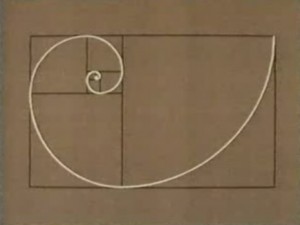 |
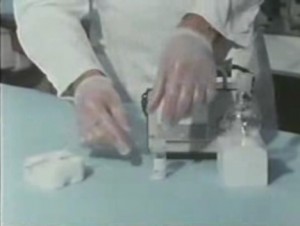 |
The BBC’s Maths Topics, meanwhile, went a stage further into abstraction by dispensing almost completely with live action footage in favour of luminous orange and white animated diagrams which explained the likes of trigonometry and probability while the slightly more avuncular tones of Fergus ‘Bit part as a priest in the Henry Sellers episode of Father Ted‘ O’Kelly filled in the details. All these programmes were “designed specifically for recorded use”, and, while a chore to sit through in school, were strangely mesmerising to the flu-addled off-school child of a mid-morning.
“Look! Can You See the Suffocating Tedium?”
It’s the dullest possible format nevertheless (geographical efforts in this vein, in particular, such as Landmarks and The Geography Programme, numbered among the square-eyed pupil’s most-hated programmes), so how could you spice it up a bit? Sex? That wasn’t the thinking behind Grampian TV’s Living and Growing, obviously, but this ‘personal growth and development’ series took the young adult through the basics of puberty via the same deadpan voiceover method, although here the visuals were more likely to prevent any dozing off at the back of the class…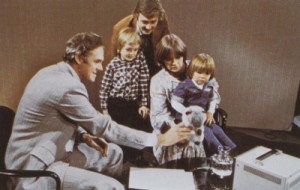
An injection of charisma is a way to pep things up, and many middle school English programmes – particularly ITV’s Middle English and The English Programme – reeled in the likes of Roger McGough, Michael Rosen and Phil Redmond to give a bit of authority to the subject. This sober format is often labelled as the most forgettable, dull type of secondary educational telly, but on well-remembered primary school programme, which is still around today, took the disembodied voice-over format straight off.
Chris Tarrant, at the time still a little-known regional DJ and jobbing local presenter, added his matey tones to ATV’s Stop, Look and Listen, an extended version of Playschool‘s ‘through the arched window’ look-at-life filmed inserts aimed at ‘slow learners’, who no doubt grooved along on the resources room carpet to its succession of jaunty theme tunes, latterly a well-remembered Focus-type flutey number. Similar treatments served for the forgettable likes of Look Around and Look, Look and Look Again, all of which led to the ‘lecture’ format being parodied, some twenty-odd years later, by the BBC’s Look Around You.
Still aping the average school lesson, but at least trying to be a bit more inclusive and welcoming, were shows that filled the studio with kids of the same age as the viewers, with a main presenter or two taking the surrogate teacher’s role. One thing they carefully avoided, however, was recreating an actual classroom set. Many were filmed in the plain studio limbo familiar to children from ‘civilian’ programmes such as Blue Peter and Playschool (some even used familiar presenters from those shows, such as Leslie Judd in Let’s Go Maths and various Home Economics-related series such as, er, Home Economics).
“Now, Let’s Hear That Again.. and This Time, Without the Music!”
Heading the faux-classroom charge were shows that encouraged audience participation while the programme was airing – we’re talking singalong, and we’re talking Music Time, The Music Arcade, Into Music et al, the televisual reworkings of the BBC’s old Time and Tune radio/cassette programmes. In a studio full of cross-legged kids, their faces betraying confusion, boredom and just a hint of toilet-related discomfort, two presenters, their demeanour and attire attempting to straddle the gulf between your slightly hippyish Magpie presenter and your uptight coffee-abusing music teacher, perched themselves on the regulation backless block seating and led the singing of simple tunes with the minimum of frills and fuss.
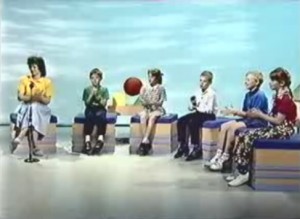 |
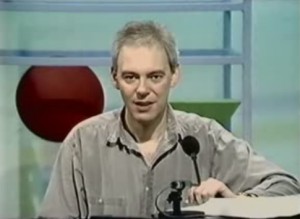 |
A slightly warmer, less formal affair, certainly, but the looks on the in-studio kids’ faces as Ian Humphries, straight-laced soprano Katherine Harries and bubble-permed Peter Coombe (plus an in-studio band of session musos inevitably led by the redoubtable Jonathan Cohen) for Music Time, Lucy Skeaping and Tim ‘Mike and Angelo‘ Whitnall and an unlikely Rob ‘Turnabout‘ Curling for Into Music, hurried them from one glockenspiel practice session to the Guess the Instrument game said it all – apart from one immensely popular trip to the BBC Radiophonic Workshop to watch Peter Howell remix the Dr Who theme, anything resembling fun was nowhere to be had.
Broadly speaking, the same class and teacher dynamic was adopted by such forgettable efforts as ITV’s general primary school ‘look at life’-ers Finding Out and Seeing and Doing, the BBC’s science and maths junior show Thinkabout, and the basic English literacy programme WaLRUS (the rather forced acronym stood for Writing and Listening, Reading, Understanding, Speaking), which started up to Jethro Tull’s ‘Living In the Past’ – just what was it with schools programme makers and flute-driven prog-folk?
“Oh Charlie, Really!”
Taking a bit more effort to lift this fake class situation out of the doldrums, primary school reading BBC show Words and Pictures, which was, at least in its post-1974 format (more on its origins later) ostensibly set in a hazily defined children’s library-cum-activity-centre, jazzed up the otherwise prosaic scenario with Charlie, the faintly anarchic, bow-tied blue-screen superimposed 2-D sponge puppet assistant to Henry Woolf, Vicky Ireland and co. (to help the informal air, they were always ‘caught by surprise’ by the camera at the start of the programme as they were ‘waiting for the children to arrive’).
Thus the meat-and-potatoes task of learning about ‘-ing’ words could be largely palmed off on animated inserts, often with the lyrical talents of a Derek Griffiths (Look and Read‘s almost-too-celebrated ‘Magic E’) or Fred Harris (Words and Pictures‘ seminal ‘Brave, Brave Mouse’), while the ‘original odd couple’ in the studio could clown around… within pedagogically acceptable limits, of course.
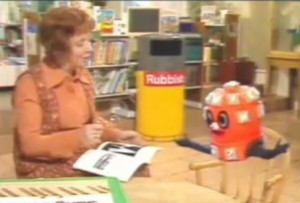 |
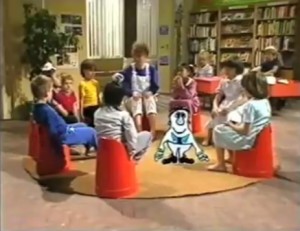 |
Now you had a bit of legit irreverence – you couldn’t show a child wantonly getting the wrong end of the stick, goofing off or mucking about, and the teacher-substitute certainly couldn’t get away with it, but a cartoon/puppet could easily come capering on for a spot of mucking about when the pace flagged, then simply leap off screen with a high-pitched ‘wa-hey!’ when the time came to practice those letter ‘m’s. The puppet-stooge format even crossed over with its showbiz roots with the likes of Reading With Lenny the Lion and Let’s Read with Basil Brush, where the business of going over a simple storybook on screen was enlivened with a bit of celebrity glove-operated crosstalk.
Filming with a studio full of distracted six-year-olds can be a time-consuming business, of course, so it’s not surprising most schools programmes ditched the classroom approach and aped the bog-standard presenter-to-camera format familiar to kids via the likes of Play School et al. Watch!, to take one of the fondest-remembered examples, provided junior pupils with a weekly dose of ‘topic work’ on a different subject each term – Darwin and evolution, Defoe’s Robinson Crusoe (who was, as we all recall, all alone, and all on his own), various overseas cultures and assorted historical periods (the Romans, feudal Britain) were among the areas covered by a smiling man-woman duo (most famously the gra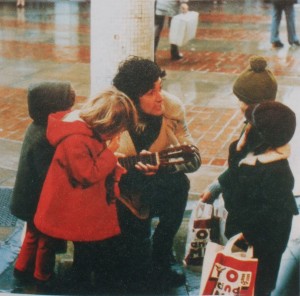 nd-sounding yet relentlessly chummy Louise Hall Taylor and James Earl Adair).
nd-sounding yet relentlessly chummy Louise Hall Taylor and James Earl Adair).
As well as the informal clothing (open-necked shirt or bright polo-neck for the ‘boys’, floral prints and roomy blouses for the ‘girls’), the trick used here was to have the presenters appearing to learn along with the viewers, rather than declaiming facts and figures straight at them. They didn’t have all the answers, but could find them out, thus (hopefully) spurring the children on to further study after the programme. ITV got in on this junior general studies act with the less well-remembered Over To You, with Wendy ‘Zoe off Dr Who‘ Padbury and friend conversing in an all-black studio, which proved less memorable than the titles, in which a Yellow Submarine-style animated hand/face creature in a woolly hat rushed around the screen to a burbling synth theme.
This sort of relaxed approach helped make the weekly (if you were lucky) TV session more engaging than a simple excuse to doze off in the darkened resources room. When it worked, at least. But for every My World (a notoriously dull moralising magazine-ish morning programme which had two strands, “Stories” and “Real Life”, hosted by an over-earnest pullovered chap who bade an emetic “take care!” at the end of each show), or Near and Far (geography-based projects, of which the rather alarming Radiophonic theme tune and zoomy-out title sequence is the only part that made much impression), there was a Merry-Go-Round or a Zig Zag (themed general investigations similar to Watch! but aimed at the middle school crowd).
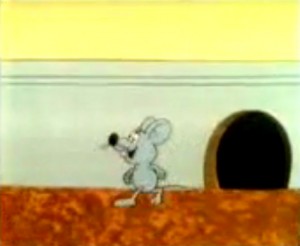 |
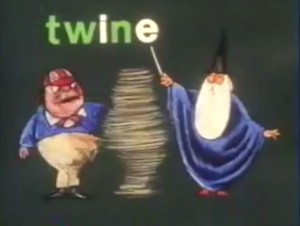 |
Human-puppet interaction was happening all over the shop, in the Wordy segments of Look and Read (of which more later) or the dialogues between Duncan the Dragon and human interlocutors (such as Michael ‘No 73‘ Maynard, Anton ‘Space 1999‘ Phillips and the great Derek Griffiths) of You and Me, which also used puppet double-headers (the animated Crow and Alice, who spoke to live action figures via intercut film (with voiceovers from the authoritatively avuncular Nigel ‘Shillingbury Tales‘ Lambert), the slightly annoying Purrfector, and later the traditionally-operated market stall monkeys Cosmo and Dibs, minded by the likes of Kate Robbins and Gary Wilmot).
“Let’s See How Malcolm’s Been Getting Along in That Flooded Cemetery.”
The best example of this ‘aunts and uncles’ approach is probably the BBC’s early ’80s middle school science show Science Workshop. From a vaguely Blue Peterish studio base, a trio of friendly adults launched investigations into phenomena such as colour, mass, and that old dependable, the materials kit. Not dissimilar to a raft of other schools’ shows (eg the Max Mason-fronted Starting Science), but there was a little personality dynamic worked up among the protagonists that owed something to Purves/Singleton/Noakes-era Blue Peter, and which proved very popular with the kids. Taking the ‘fatherly’ role was the redoubtable Derbyshire-born character actor David ‘Mr Juliet Bravo’ Hargreaves, who marshalled the proceedings in a kindly sort of no-nonsense manner.
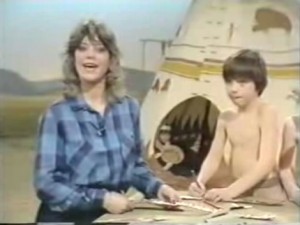 |
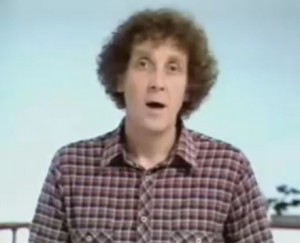 |
Former How! presenter and vocalist with The Ladybirds Marion Davies took the glamorous Singleton/Judd position, acting as a ‘softer’ voice of reason, and mediating between the serious Hargreaves and Malcolm McFee, an ex-Please Sir! pupil, who took the mantle of the ‘Shop‘s ‘roving reporter’ and, more importantly, clown. Children settled down in front of the bouncing cartoon elephant titles safe in the knowledge that at some point Our Malcolm would be guaranteed to fall in a canal, get covered in paint, or have some other humiliation heaped on him. A simple enough bit of ‘jazzing up’, really, but when it comes to the notoriously ‘difficult’ subjects of maths and science, anything that’ll keep a fidgety kid looking at the screen long enough to grasp the concept of areas and gravity is desirable to say the least. Perhaps that’s why it’s these subjects that have produced some of the oddest schools’ programmes of all…
It’s 1979, and you’re landed with the task of writing a series of television programmes for the BBC teaching primary school children about basic mathematics. You’re given a comprehensive dossier, drawn up by the Beeb’s educational experts, detailing precisely the topics that should be covered in each programme – the number line, basic geometry, volume and mass, and so forth. One proviso – “Make it interesting,” says a commissioner. “Something children can enjoy, not a boring maths lesson.”
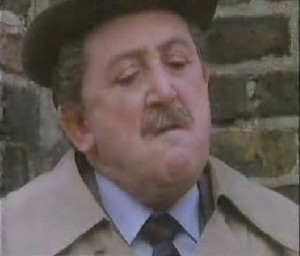 |
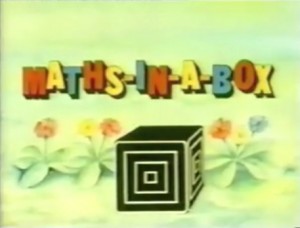 |
This was the task that Alex Glasgow, famed socialist Tyneside folk singer-songwriter and long-term children’s programme contributor, was faced with. He came up with one of the best-remembered (albeit in a “what on Earth was that?” way) educational programmes, namely Maths-In-A-Box. The premise was one that’s been used many times since – an alien lands on Earth, and, befriended by two children, is taught the rudiments of science. Powka, the ET in question, took the form of a genial-but-batty old man in op-art overalls, a Dr Who/Johnny Ball type, who travelled around in a TARDiS-like black and white box the size of a die (on the outside). The “ship” had a talking computer, which conveniently filled in some of the educational gaps, and supplied memorable if (intentionally) awful-sounding songs at the end of each episode. Throw in the occasional bit of location work (eg. ‘mass’ explained by a trip to a West Country funicular railway) and the abstract maths concepts were put over in a simple way, with a bit of comedy and adventure to sugar the pill.
“Can’t Stop – Got to Round Up These Figures Before the Council Get Here!”
Many other maths programmes went down the drama route. The BBC’s mid-’80s series Maths File followed the capers of police inspector Fred Newton (Tony Hughes again), a moustachioed bumbling fool of Clouseau-esque proportions (albeit with a Surbiton accent), who managed to solve his maths-related cases only with the clandestine help of long-suffering WPC Susan Jones, while Hilda Braid shambled about in the background with a mop as the archetypal ‘charwoman who knows more than she lets on’. Such a triumvirate of arithmetical diagnostic talent pitted their wits against villains whose elaborate felonies always involved multiplying areas, number lines and conveniently elementary stuff like that – the existence of a late-night, Sweeney-esque task force that dealt in trigonometry trafficking and calculus assault was a tempting possibility never realised.
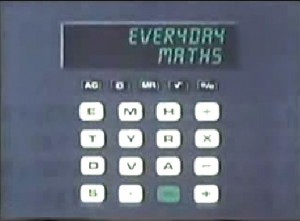 |
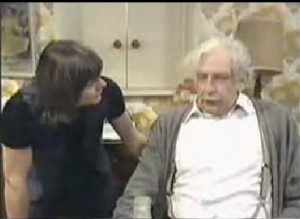 |
Wondermaths, another sci-fi show, featured another singer, Christopher Lillicrap, working out mathematical conundra in an outer space environment with a dim-witted robot sidekick. More down to Earth were the likes of Maths Counts and Everyday Maths, two largely location-based shows that followed the everyday lives of a group of working class adults (Roy Kinnear in the former, and Jack ‘Pufnstuff‘ Wild and Arthur English in the latter, were among the casts at various times) grappling with estimating bills, pocket calculators and timber measurements. Although these were made as adult education programmes (in the manner of On The Move or Make It Count) they were just at home being aired in the schools’ timeslot.
At the other end of the scale, Capricorn Game, a rather odd series for the very young, introduced concepts such as pairs and rudimentary counting via the odd device of a middle-aged couple being set a treasure trail series of real-world problems by the titular gnomic animated wizard and his talking goat-headed umbrella, by way of yet another cringe-inducing song – “I’m Mr Capricorn, and I’m a clever fella/I wear a coat that’s torn and I found a magic umbrella,” vouchsafed our host in the title ditty, without a care that the evidence for his supposed genius pointed rather to scruffiness and blind luck respectively. But when you’re a gnomic educational cartoon character (albeit one who, due to budgetary restrictions, appeared in the programme introduction played by a bloke in a freakish full-sized costume), you can get away with murder.
“Mam! The Mineshaft’s Just Caved In! Dad’s Trapped! Oh, and Someone’s Invented the Wireless.”
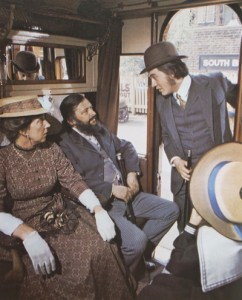 It wasn’t just maths that got the ‘adventure’ format. Every damned dull-as-Abzugsgrabenwasser foreign language programme, from Encounter to Tele-Journal to Kontakte had little stilted scenes of miniature crisis played out by third-string Equity types who ‘had a bit of Italian’ on their CV, but enough about those. Before it settled down to the ‘library’ scenario detailed above, Words and Pictures ran a series called Sam On Boff’s Island, starring Tony Robinson as an everyman marooned on an island populated by a society of weird puppet fauna (the titular Boffs) with their own range of linguistic quirks and obsessions.
It wasn’t just maths that got the ‘adventure’ format. Every damned dull-as-Abzugsgrabenwasser foreign language programme, from Encounter to Tele-Journal to Kontakte had little stilted scenes of miniature crisis played out by third-string Equity types who ‘had a bit of Italian’ on their CV, but enough about those. Before it settled down to the ‘library’ scenario detailed above, Words and Pictures ran a series called Sam On Boff’s Island, starring Tony Robinson as an everyman marooned on an island populated by a society of weird puppet fauna (the titular Boffs) with their own range of linguistic quirks and obsessions.
Going to the other extreme of school life, Central’s Starting Out bested the usual drab lecture-style “get a job” programmes (Going To Work, Job Bank, Making a Living, A Job Worth Doing?, It’s Your Choice et al) by dramatising the lives of a family who’d moved from the recession-stricken north to London, and the tribulations they faced (the dole, low-wage supermarket jobs, further education, money management) with considerable aplomb, rather in the manner of a more practically-minded Tucker’s Luck, complete with a punked-up theme tune and a title sequence that took about three minutes explaining the convoluted situation.
At their best, dramatised schools’ programmes succeeded in drawing in an inevitably distracted audience, often taking them into areas of drama they wouldn’t look at twice in the context of non-educational TV. Yorkshire TV’s How We Used to Live, a series of period dramas revolving around the lives of family members, and set in various eras from the Victorian age through Edwardian and Second World War series to the 1960s, is probably the best of the lot.
On a fairly low budget, reasonably authentic settings and costumes were conjured up, and the fictional ups and downs of the protagonists dovetailed very neatly in with the historical events and issues that were covered (early shows included a ‘breather’ segment of narrated showreel footage at the start of each programme and halfway through, to impart some solid facts). Yorkshire showed the series after News at 10 at one point as it had proved such a popular programme in the schools slot.
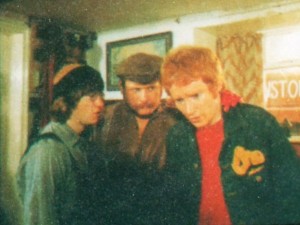 |
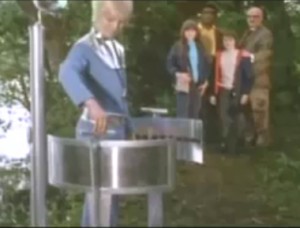 |
But mention schools drama and most people will think of Look and Read, the literacy-boosting series of adventure dramas (written by such noteables as Richard ‘Catweazle‘ Carpenter and Andrew ‘Peculiar Practice‘ Davies) reminiscent of the old Children’s Film Foundation matinees. Here the drama was of a more basic standard, and the aspects of grammar and punctuation were obviously shoehorned in, but it was all put together capably enough for stories like Joe and the Sheep Rustlers (basic early-doors Famous Five-ish rural crook foiling); The Boy From Space (well-loved and ‘reversioned’ sickly-looking junior alien espionage with reversed writing gimmick); and Sky Hunter (modish ‘save the Peregrine Falcon’ Welsh egg collecting inrigue with yet more backwards business) to linger in the minds of viewers for years afterwards.
Other shows offered drama for drama’s sake, to stimulate classroom discussion (the long-running, acclaimed ‘junior Play for Today‘ umbrella series of plays for secondary schools, Scene) or, at the other end of the spectrum, a bit of good old PVA-glue-and-spatula topic work (the ragbag of international, often entirely silent and quite mesmerising, short films introduced by Alan Rothwell in Picture Box).
Lastly, there are shows that decided to take the main problem of teaching kids – their attention spans are easily stretched to snapping, especially in a school situation – and decided to throw a little bit of everything into the mix, never letting the pace slacken, in the manner of a Kenny Everett Show (or, more realistically, a Johnny Ball programme such as Think of a Number, one of the best after-hours educational kids’ programmes there ever was).
Producer David Roseveare was one of the first to hit upon this idea in the ’70s, with the arithmetical hotch potches Mathshow and Maths Trail, which combined animated geometry skits with real-life pastiches. Tony Hughes adopted a copyright-dodging mix of the Baker and Troughton looks with Jon Pertwee’s voice and a prop yoyo (though they used the original music) for the well-loved Who parody Dr Where.
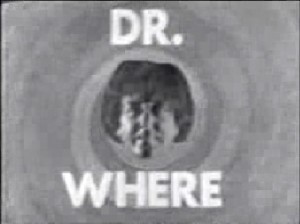 |
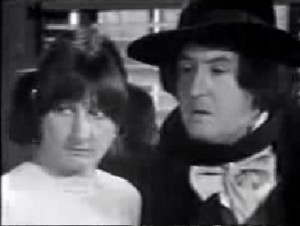 |
The Doctor and assistant Sally-Ann (Jacqueline Clarke) were called in by The Brigadier (Charles Collingwood) to solve such esoteric phenomena as a hillside where people disappeared when crossing a certain line (solved by placing of paper plates and ‘learning about symmetry’) and a roulette wheel always coming up 23 (solved by cutting up a newspaper and reading out random words, Bowie-style, till they stopped making sense and probability was restored). Hughes was also the loud-suited, Jewish mathematical entrepreneur Des Cartes, full of crummy schemes such as kitting out his singing sensation charge Jet Astro (‘Zoom, baby!’) with ‘a few new numbers’. All this was linked, as if there wasn’t enough visual confusion, by explanatory animations narrated by a talking square and triangle.
“What These Kids Need is a Dick Tahta!”
A series of shows featuring redoubtable kids’ presenter and science enthusiast Fred Harris – Leapfrog, Basic Maths, Junior Maths and later Video Maths – again mixed animated segments. The man to blame for these weird audio-visual assaults were producer Paul Martin, mathematician Dick Tahta, and his colleagues at the Leapfrogs Group – those brainy educationalists who, round about 1972, ensured blackboards full of long division were replaced in junior schools by coloured blocks, bright wallcharts and the phrase ‘ten-ty’ to mean ‘one hundred’.
Shadow education secretary Margaret Thatcher was not impressed, but Dick didn’t stop there, collating all the most ‘progressive’ ideas in junior maths teaching – especially the hypnotic self-drawing-line geometry films of Jean-Louis Nicolet – into Leapfrog, a sort of mad, child-friendly jamboree of animation (marching squares, base 2 counting, elegant geometrical ballet) usually set to the spooky, off-kilter blues electronica of Ron Geesin, and in-studio investigations into shapes, patterns and whatnot from the estimable Harris and Sheelagh Gilbey (with help from ‘Sylveste’ McCoy).
It all followed one Professor Caleb Gattegno’s ‘psychoanalytic’ approach to teaching maths. Or to put it another way, it was downright weird, and got under your skin after a few episodes whether you were mesmerised by it, or repelled by the weird clangy noises and shapes that moved on their own. As to its effectiveness at teaching its chosen subject, well, God knows – we watched them all and we still can’t count.
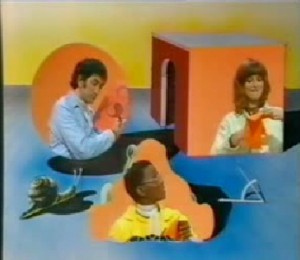 |
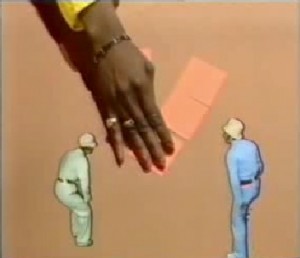 |
More in the ‘normality zone’ of mathematical lecture were Mathscore One and Two, which numbered Nuts In May star Roger Sloman among its presenters, adopted a vague footballing theme (‘Your Mathscore is now one!’), with presenters slipping in and out of costume to enact demonstrative comic vignettes about square numbers, tessellation and that old favourite, the Chinese emperor with the ever-doubling amounts of grains of rice on his chessboard, which turned up on many programmes, always following the same pattern. ‘One, two, four, eight… hmm, this is a bit dull’, then: ‘Oops! Look’s like I’ll need a bigger board!’ leading up to the inevitable studio-sized checkerboard with two-ton crates of rice being lowered from the ceiling, ‘and we’re not even half way through!’
This quickly became the schools maths equivalent of My Old Man Said Follow the Van, wheeled out to the joyous applause of recognition on a regular basis. ‘If in doubt, get the rice out,’ was the familiar slogan up and down the corridors of the West Tower in Television Centre.
“No, He’s Having Some Nice Brogues, and That’s That.” “But Muuuuum…”
Many other shows used the ‘bits and bobs’ approach to flesh out their basic format – Words and Pictures with their animated animals, Look and Read’s illustrated songs, etc. One sketch show even took the idea of kids getting involved to an extreme – ITV’s Good Health played like a cross between Why Don’t You..? and You Must Be Joking!, albeit more informative than the former and much less abrasive than the latter.
Taking the amorphous form of a revue put on by a class of children (often, quite reasonably but inexplicably, from a Wolverhampton junior school), and sometimes even documenting the rehearsal and construction of the show, this bitty little programme managed to throw up a fair few memorable moments.
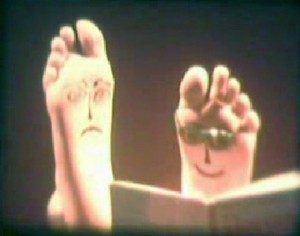 |
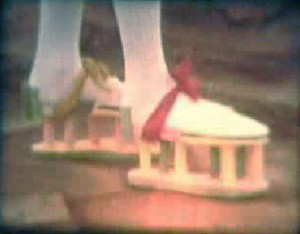 |
There was a bizarre play about germs of the ‘don leotards and polystyrene ‘antibody’ headdresses, then run around the school hall rugby tackling each other’ variety. There was a slightly – only slightly, mind – more organised production in similar vein about dental decay, with white-coated kids manhandling a giant toothbrush with which to ‘scrub’ their dentally-acting peers. There was also a huge, revolting, working model of a human digestive system built from scrap materials, which was surely condemned by the council the moment the credits had finished rolling.
Most significantly, however – although this may just have been because the programme in question happened to be repeated ad infinitum – was Good Health Talking Feet, a chiropody-themed laugh in hosted by two feet with faces drawn on them, and featuring the cautionary Blockaboots sketch. This mini-epic, satirising the early 1970s trend for uncomfortable platform shoes at the expense of ‘some nice, sensible brogues’, was at once a health education film and a touch of cheeky anti-capitalist satire. A shoe company boardroom, presided over by a junior Adrian Chiles figure, ruthlessly rejects a variety of shoe designs until the titular six-inch soled sandals are decided upon, the Brummie mini-mogul’s eyes twinkling gleefully at the magnificent simplicity of the cash-generating folly. ‘They’re in fashion today!’ Needless to say, someone falls over, and all hell breaks loose. There’s a moral there, possibly.
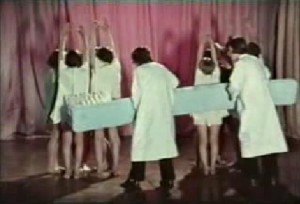 |
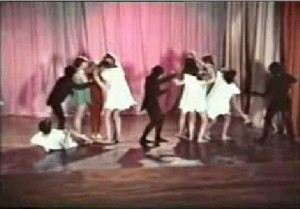 |
Neither achingly funny or particularly well-made, Good Health was nevertheless a much enjoyed and well-regarded show (the Blockaboots edition was still being syndicated well into the 1980s, long after its fashion satire had ceased to be relevant), simply because it showed some kids, mucking about – which was just what its audience wanted to be doing instead of being stuck in a black-shuttered room at 11AM on a school morning. In other words, it did what all successful educational TV did – it made the pupil feel as if he/she wasn’t being taught at all. Admittedly, that’s because, quite often, he/she indeed wasn’t learning anything at all, but you can’t have everything, can you?


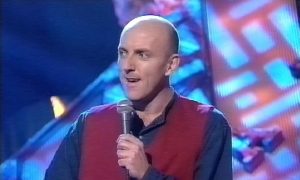

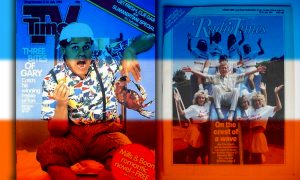

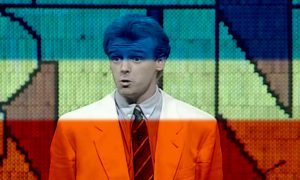















Rob Free
September 15, 2009 at 10:43 pm
Was Fred Harris a huge Ron Geesing fan? it seems that whatever show Fred was on was more often than not soundtracked by Ron’s bizzare (and to a 9 year old frankly trouser browningly scary!) soundtracks.
Josephine
September 16, 2009 at 8:30 am
Ahhh, the days when all kids were allowed to watch tv. I remember how all the class used to moan loudly about having to watch The Way We Used To Live and cheer and clap when it was Living and Growing.
Glenn A
August 25, 2010 at 4:47 pm
Ever thought of doing a feature on Radio 4 schools programmes from the seventies which were equally important. I can remember at primary school everyone going into the hall at 9am for a five minute news bulletin followed by a Service for Schools( Geoffrey Wheeler when not on Winner Takes All). Other favourites we had were Movement and Drama, Singing Together( which ran for decades seemingly and one of the teachers had songbooks dating back 26 years) and Web of Language, an English programme aimed at higher primary/lower secondary pupils. Also memorable from this era was an interlude between programmes played on a harp, followed by an announcement by a very BBC type about the next programme.
Martin
March 8, 2012 at 6:37 pm
Great to watch when you’d taken a ‘sickie’ for the day,
Nikki
December 29, 2012 at 6:50 pm
Blockaboots!!!!!!!! I’ve only just got that bleedin song out my head, been singing it since 1981 and now it’s back again after stumbling upon the TV Cream website! What a blast from the past, especially that creepy man from Picturebox who turned out to be a junkie in Brookside in the 80’s. that horrid little blue alien boy (always wondered why I knew so much about peregrine falcons) and Wordy and that annoying pencil with a light in the end! What the heck was that ten-ty nonsense, no wonder I’m number dyslexic! Off to watch How We Used To Live on YouTube. Thanks for the memories!
Nikki (aged 39 and a half!).
Scott Macmillan
February 4, 2015 at 1:53 pm
Can any one tell me where the photo was taken at the top of the page
where some are watching TV the rest lying down reading. looks pretty
much like my old Primary school North Muirton Primary Perth Scotland
think that’s me at back of class watching TV black/white top short
blond hair. Pretty sure thats my class. can anyone help with identifying
photo. TV CREAM CAN YOU HELP ITS YOUR WEB PAGE as well. email
me with deatail of photo etc makk10@mail.com
Sarah
March 20, 2015 at 5:24 pm
Fascinating to read the blog post and the memories above. Readers might possibly be interested in a recently published book (see link above) which is an actual diary kept by a secretary working in the BBC’s School Broadcasting Council in 1971. It’s great fun.
David Wall
June 10, 2021 at 11:11 am
I’ve recently been watching Prisoner Cell Block H and noticed that they keep using a piece of incidental music which sounded familiar! After a bit of research noticed it was the intro to the well loved Schools & Colleges telly show ‘Picture Box’!
Droogie
April 2, 2023 at 12:11 am
WaLRUS was a damn weird schools show. I never saw it in school – only during afternoons off sick watching the telly. The Jethro Tull theme stuck in my head, as did the format. They’d show a drama ( one called Tich And The Trifles about a schoolkid who shoplifts a fancy box of chocolates for his mum’s birthday from the local sweet shop sticks with me.) Then they’d go all 4th wall and have a segment where the characters from the drama are questioned in a TV studio by Timmy Mallet playing an hippy interviewer called George Dogger (!) I’d like to watch these shows again to see if they were as bizarre as I remember, but no one seems to have uploaded them.
Droogie
April 6, 2023 at 1:11 pm
I remember catching a few episodes of WaLRUS on school sick days. A strange programme that felt like it was written by hippy sociology teachers ( the Jethro Tull theme was a giveaway.) They’d show a drama ( one about a kid stealing a box of chocolates from a sweet shop for his mum’s birthday comes to mind) then they’d go back to the studio where characters from the play would be interviewed by Timmy Mallet playing a presenter called George Dogger (!) Weird show, but definitely more interesting than Maths File.
Glenn Aylett
April 6, 2023 at 8:23 pm
I can remember a really dull, cheap effort from Granada called UMIST Physics( recorded in the labs at UMiST, not far from Granada to save even more money) which was basically a lecturer going through demonstrations for O level Physics students.
OTOH Yorkshire seemed to spend a considerable amount on How We Used To Live, set in a fictional part of Yorkshire in the late Victorian era, that could almost be shown in peak time as the production values were so high. I used to always enjoy watching this at school and when I was off sick.
Another historical effort from the BBC that stood out in the late seventies/ early eighties for me was 20th Century History. One I remember watching about Hitler’s rise to power and a Nuremberg rally seemed to have a very high budget, plenty of fooage of Adolf and friends, and a high standard of narration and background music.
George White
April 7, 2023 at 12:39 pm
Some of the Scene films had big budgets. There’s one that was a coproduction with CBC, Songs of a Sourdough – shown primetime there, with Fulton Mackay, Barry Morse, Gordon Pinsent, Gary Reineke and John Ratzenberger.
Glenn Aylett
April 7, 2023 at 2:27 pm
Scene could be like a Play For Today at times and touched on subjects like teenagers running away from home and juvenile delinquency. Interesting how a slot now occupied by property shows once contained cutting edge dramas aimed at secondary school pupils and I can remember one where a liberal teacher offered a rebellious Liverpudlian kid a cigarette as he discussed his lack of prospects after school.
Droogie
April 9, 2023 at 3:57 pm
@GlennAylett. I remember being shown a few worthy school dramas on unemployment, teen pregnancy etc in various classes that were as much a warning as being educational. A few documentaries too, like one in Religious Studies about junkies in Glasgow. I’ll never forget a scene where a heroin addict is being interviewed. The guy couldn’t get hold of any smack so tried injecting “ jellies” ( Valium) instead. His body didn’t like this and he had to have most of his fingers on one hand amputated. I still remember the collective gasp of disgust from the class at the close up of his manky hand holding a cigarette with his 2 remaining fingers.
Glenn Aylett
April 9, 2023 at 4:42 pm
@ Droogie, I can remember one from 1970 that was shown about a woman who died of an overdose with an interview with her hippy boyfriend about how she became addicted to drugs. I think it was called Gail Is Dead.
George White
April 14, 2023 at 9:13 am
The excellent broadcastforschools.co.uk is much recommended. Weird that the BBC had short-lived attempts trying to integrateUS educational shows from PBS into the BBC Schools umbrella, e.g. the Electric Company (with Morgan Freeman and Rita Moreno creating ‘Hey, you guys!’ as a phrase before Sloth off the Goonies), and Mathnet/Square One (which featured James Earl Jones as the chief, and a cast full of US TV vets like Kevin McCarthy, Kenneth Mars, Geoffrey Lewis, Ron ‘Superfly’ O’Neal, Al ‘Grampa Munster’ Lewis, Dick ‘Darrin II’ Sargent, Arnold ‘Top Cat’ Stang, both Marcia Wallace and Yeardley Smith, Rex ‘Myra’ Reed, Weird Al Yankovic, William Windom, James Karen, Wayne Knight). Only the BBC copro Ghostwriter in the 90s seems to have lasted, which of all things, featured a pre-Pulp Fiction Samuel L Jackson as one of the dads, until he got too big for a BBC Schools drama and thus was recast.
HBO showed quite a few BBC School programmes in the US – Testament – the Bible in Animation, Shakespeare The Animated Tales, and Animated Classics including a Rod Steiger-voiced Moby Dick in the late 90s.
Also at least two schools programmes were shown on US big three networks – the all-star stop-motion Jesus BBC/S4c presentation The Miracle Maker on ABC and an ITV Schools Middle English/ABC Afterschool Special – The Night Swimmers with Trey ‘Raising Arizona’ Wilson.
Glenn Aylett
April 15, 2023 at 11:59 am
@ George White, there was one very long running educational programme from America that was a regular on ITV for years, Sesame St. I quite liked how they incorporated Muppets, humans and cartoons into a 50 minute learning programme.
George White
April 16, 2023 at 3:19 pm
True but that is obvious.
Also discovered Scene showed a few AFI short films, Ted Demme’s short the Bet and a 1995 ABC Afterschool Special, Montana Crossroads as well as serialisations of the PIF Our Day Out and Derèk Jacobi in Breaking the Code
Richardpd
April 15, 2023 at 2:41 pm
Reading Rainbow was another American educational programme that ran for a long time, presented by LeVar “Geordie” Burton.
George White
September 30, 2023 at 11:10 am
The English Programme would often reuse eps of adult shows including the World at War meaning that technically Larry Olivier was an ITV Schools host.
ITV also showed films made by Learning Corp of America including a 1969 John Irvin film with Anthony Hopkins as Wat Tyler.
George White
January 4, 2024 at 12:12 pm
The language shows are interesting. The BBC not only made thriller serials like Suivez la Piste and Komm it in foreign languages for British TV, but also made English-language serials for foreign TV stations and foreign language courses. Slim John, shot by b-movie vet John Paddy Carstairs, starring Simon Williams as an alien, the Filipino-made the Sadrina Project with Jeremy Bulloch and veteran Filipino movie actor Vic Silayan (who bizarrely released a cover of Jack Charlton’s Simple Little Things), and the one I just discovered – 1986’s the Lost Secret, where Tom Wilkinson (still in his jobbing character actor phase) loses his memory, Miranda Richardson’s a femme fatale and Vladek Sheybal is a shady foreign scientist.
The first was Walter and Connie, directed by film directors Clive Donner and Max Varnel, featuring hattie Jacques as herself, then the Bellcrest story, a kind of sub-Brothers business soap with Norman Bowler, john Horsley, Nigel hawthorne, elizabeth Sellers, and Edwin Richfield, then on We Go with Christopher Strauli and Ronald Howard, People you Meet with tim bateson in a different role every ep, Bid for Power with Edward de Souza, Michael Aldridge and Gareth hunt, set in some banana republic played by Malta.
Little is known about:
Conundrum with With Ian Redford, Patrick Godfrey, Alan Ford, Gerard Kelly, Victor Winding, Bill Nighy.
The Carsat Crisis with With Trevor Baxter, Bruce Purchase, Vernon Dobtcheff, Garrick Hagon, Alan Rowe.
And nothing about Challenge, Follow Me, Hello, Songs Alive, People and Places,
Glenn Aylett
January 4, 2024 at 3:05 pm
It’s a shame these often excellent schools programmes will never be seen again and they seemed to veer from the ultra cheap, a university lecturer doing a physics experiment in a lab to almost peak time dramas like Scene.
Also did anyone who took German O level in the seventies and eighties use a BBC audiovisual course called Frisch Begonnen. This was a clever course where a teacher would put up a slide from a projector and the narrator and actors would talk in German on an open reel tape about something like catching a tram or ordering a meal in a cafe and the class would repeat what they were saying, before there was a bleep to move to the next slide. I can remember Frisch Begonnen being an excellent tool to learn German and my German master being very fond of this course from circa 1970.
Richardpd
January 4, 2024 at 10:11 pm
I presume there are rights issues or a lack of interest preventing any home release of old schools programmes.
Also some master tapes for some were binned when the BBC couldn’t afford to digitise them in the 1990s.